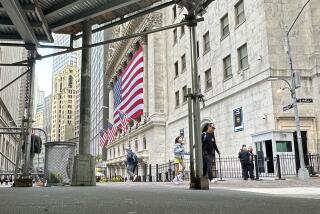FINANCIAL MARKETS : Stocks Mixed at Quarter’s End; Bond Prices Up : Markets: Dow climbs as much as 20 points before falling back. Yields retreat on hopes for a U.S.-Japan accord.
Stocks ended the quarter on a mixed note Friday after computerized selling strategies buffeted the Dow Jones industrial average in the final half-hour of trading, causing the average to register its second straight decline.
The blue-chip indicator of 30 big-name stocks closed at 3,843.19, down 11.44.
The average had been up as much as 20 points in the afternoon, boosted by the second consecutive day of upbeat economic news and encouraged by a firming bond market.
Stock prices were also driven higher early in the session as investors bought some star performers to add to their portfolios before the end of the quarter.
Portfolio managers “need to look good for the quarter” in their reports to investors, said Trude Latimer, a stockbroker at Ferguson Andrews in Charlottesville, Va.
Broad-market indexes outperformed the Dow average and ended the day higher.
The NYSE composite index rose 0.37 points to 255.52. The Standard & Poor’s 500-stock index rose 0.45 points to 462.69. The Nasdaq composite index of mostly smaller companies rose 4.95 points to 764.29. At the American Stock Exchange, the market value index rose 2.34 points to 458.81.
Despite the last-minute selloff in the Dow, advancing issues outnumbered decliners by about 3 to 2 on the NYSE. Big Board volume totaled a moderate 291.94 million shares.
Long-term bond yields retreated as investors held out hope that the United States and Japan would meet a weekend deadline for settling a trade dispute. Shorter-term securities ended mixed.
The 30-year bond yield rose early in the day but turned around to close at 7.81%, down from a 2 1/4-year high of 7.84% on Thursday. Its price was up 5/16 point, or $3.13 per $1,000 in face value.
Sparking the retreat was a report of a U.S.-Japan agreement that could open up some Japanese government contracts to American companies.
The report, by Japan’s Kyodo News Service, was denied by the Clinton Administration. But heightened hopes for a deal helped bonds retain most price gains.
Meanwhile, the Commerce Department reported that Americans’ spending rose 0.9% in August, the largest increase since February and slightly above analysts’ expectations.
The department also said personal income rose 0.4% in August but failed to keep pace with spending, suggesting that this year’s interest rate increases have not been enough to discourage consumers from borrowing to finance purchases.
Analysts said the numbers indicate a slightly more robust economy than they had expected. The data substantiates Thursday’s reports of unexpectedly large increases in August new home sales and in the nation’s second-quarter gross domestic product, and of a drop in initial unemployment claims last week.
Thursday’s data sent the Dow down 23 points as investors feared that it would prompt the Federal Reserve Board to increase interest rates a sixth time this year in an effort to head off inflation.
While Friday’s reports did nothing to change that view, portfolio managers focused instead on recovering bonds and on adding high-performing stocks to their holdings before they issue quarterly reports to their investors.
There was a renewed interest in cyclical stocks, which had taken a beating earlier in the week.
Among the market highlights:
* Philip Morris rose 1 1/8 to 61 1/8. It said it was in talks on the sale of its Kraft Food Service business.
* General Mills gained 1 1/8 to 57 3/4 and Kellogg rose 1 5/8 to 57 3/8 on a “buy” recommendation by Morgan Stanley.
* Pillowtex, maker of bed pillows, mattress pads and other textiles, fell 1 3/4 to 13 1/8 after saying its third-quarter earnings would fall short of Wall Street forecasts.
* Retailer Nordstrom gained 1 1/4 to 40. Bear Stearns upgraded the stock to “buy” from “hold,” citing expectations of strong sales.
Auto stocks recovered after losing ground Thursday amid fears of higher interest rates. Chrysler rose 3/4 to 44 7/8 after the company said it would increase its capital spending. General Motors rose 1/8 to 46 7/8 after the company reached a tentative pact to end a United Auto Workers strike. Ford rose 1/4 to 27 3/4.
Overseas stocks ended mixed. Germany’s 30-share DAX average ended at 2,011.75, down 31.83 points, while London’s Financial Times 100-share average closed 33.8 points higher at 3,026.3. In Tokyo, the 225-share Nikkei average finished down 51.31 points at 19,563.81. Mexico City’s Bolsa index gained 28.6 points to close at 2,746.11.
The trade optimism boosted the dollar against the Japanese yen, increasing the allure of dollar-denominated instruments such as Treasury securities.
In New York, the dollar was quoted at 99.15 yen, up from 98.65 on Thursday and at 1.552 German marks, up from 1.549.
U.S. Stocks: Good Quarter, Flat Year
Led by smaller stocks, Wall Street rallied briskly in the third quarter despite rising interest rates. But for the year to date most major U.S. stock indexes are down marginally, while foreign markets are mixed. Changes, in percent:
Nasdaq composite: 3rd quarter: +8.3% Year to date: -1.6%
S&P; mid-cap: 3rd quarter: +6.2% Year to date: -2.5%
Dow industrials: 3rd quarter: +6.0% Year to date: +2.4%
NYSE composite: 3rd quarter: +4.2% Year to date: -1.4%
S&P; 500: 3rd quarter: +4.1% Year to date: -0.8%
Foreign Shares
Market (index) Qtr. (% change) Y-T-D (% change) Mexico City (Bolsa) +21.4 +5.5 Hong Kong (Hang Seng) +8.7 -20.0 London (FTSE-100) +3.7 -11.5 Frankfurt (DAX 30) -0.7 -11.2 Paris (CAC 40) -0.7 -17.1 Tokyo (Nikkei 225) -5.2 +12.3
More to Read
Inside the business of entertainment
The Wide Shot brings you news, analysis and insights on everything from streaming wars to production — and what it all means for the future.
You may occasionally receive promotional content from the Los Angeles Times.










